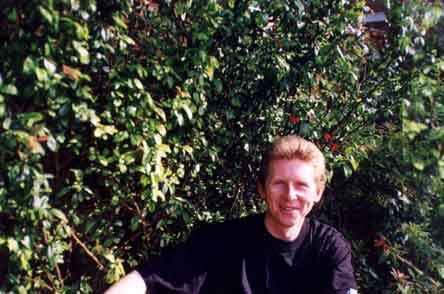
|
Alexander Levine
|
And
the Line Was Drawn
for
unaccompanied choir
duration: 11 minutes
And the Line Was Drawn is a part of the
cycle "KOVOKOVA" for unaccompanied choir. The title of the cycle
"KOVOKOVA" translates into English as "Bells" and
the image of bells goes throughout the whole cycle, which was conceived
as a spiritual projection of various aspects of human existence with a
wide range of historical, religious and Russian folklore references. Thus,
And the Line Was Drawn alludes to the theme
of this century's wars, with focus on human emotional and existential
experience (the lyric is by a contemporary Russian poet E. Gorboskaia.)
This is a story about two people, a Man and a Woman, caught in the midst
of the war. It is a farewell at the railway station where the train is
bound for the front-line and the fate seems unavoidable. However it is
neither the Man nor the Woman who play the main part in this drama. There
is a "figure in the background": their intuition, their "absolute
knowledge" of what is going to happen and their spiritual insight
embracing the time: what is happening now happened million times before
throughout the centuries and will be happening in the future to others
who might even be not born yet. This intuition is unmistakable they feel
the power of the fate which is going to tear their lives apart. But still
they don't give up on changing or at least challenging the fate at this
very last moment. It is a mere few minutes before the train leaves (and
we feel that it is never going to come back). The Woman feels that only
together they would be able to overcome the fate, and the piece starts
on this emotional upsurge. The Woman urges the Man to swear that he won't
be killed - in an almost ritual way as if the words have the power to
change the future. This moment is the pivotal point - And
the Line Was Drawn - beyond which begins the spiritual experience
of the person who gives this promise and the faith of the two people is
put on trail.
Alexander Levine was born in Moscow. He
studied piano from the age of 7 at the Gnessin Music School and later
he took up the clarinet. Upon graduation he was offered a place at the
Moscow Gnessin Music Academy where he studied in 1976-1980. During these
years he also held a position of Principal Clarinet in the Orchestra of
Russian National Orchestra of Radio and Television and shortly after joining
the Orchestra he began to contribute as arranger and composer.
In the following years he established himself as a composer working in
collaboration with a variety of orchestras in Russia, theatres, television
and film industry. His compositions won awards of the all-Russia Annual
Prise of the National Radio and Television in 1989/1990/1991.
Since 1992 Alexander Levine lives in the UK. In 1993-1995 he studied on
the Advanced Postgraduate Composition Course at the Guildhall School of
Music and Drama. He also did his MA in Composition at the GSMD in 1995.
In 1994 he was commissioned to write incidental music for the GSMD production
of War and Peace (Director Peter Clough), which was performed
live by symphony orchestra on stage. "The Times" commented on
this work: "It is not often you go to the theatre and get an orchestra
thrown in: not providing cues for numbers but underscoring dialogue with
a grand swell, like a soundtrack for the big screen" (Kate Basset,
The Times, October 29th , 1994)
His successful collaboration with the GSMD Theatre continued and in 1995
he was engaged as music director on the restoration of The Beggar's
Opera, and in 1996 Alexander Levine composed the incidental music
for the GSMD production of Love's Labour's Lost (Director
Di Trevis).
At present Alexander Levine works mainly in the field of contemporary
music. His music is performed and broadcast in the UK and abroad.
Back to shortlist.
|

|